Archived News Item
Building Bridges – A Profile of Adele Howard RSM OAM
July 2, 2021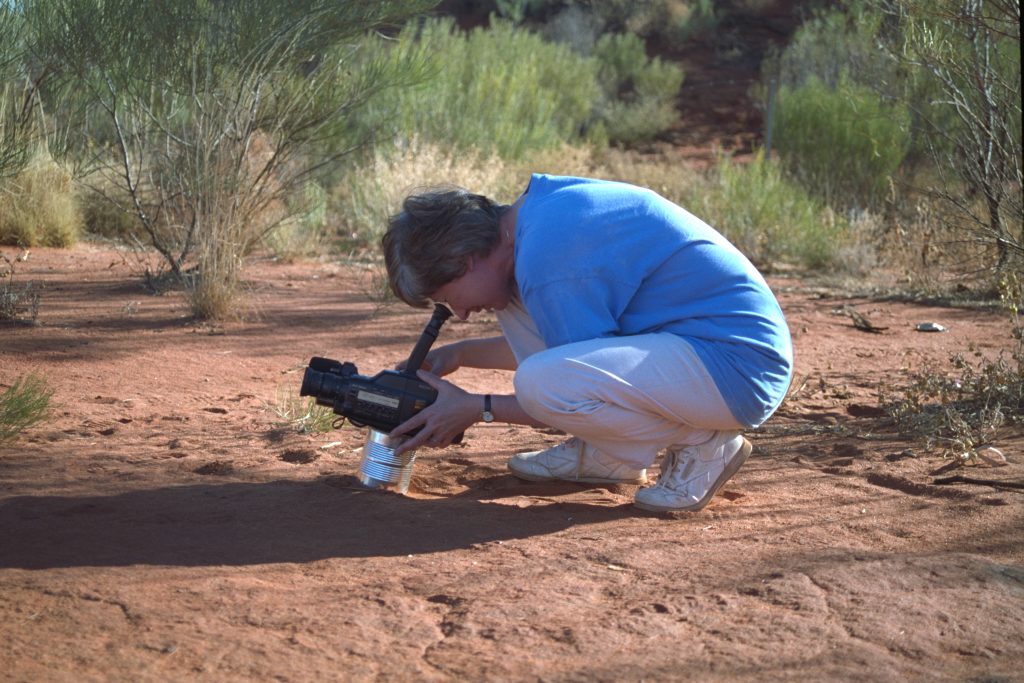
Adele filming in the Tanami Desert
(Aboriginal peoples should be aware that this article
may contain images of people who have died).
“For all of us in Mercy” is how Adele Howard RSM describes her Order of Australia Medal that was conferred as part of the 2021 Queen’s Birthday Honours.
While she admits she had some initial trepidation about accepting the award, after the announcement it all began to make sense.
“When I was notified, I didn’t feel right about accepting it!,” said Adele.
“As a Sister, we don’t do what we do for public awards. We do it because we believe in a life of service and being quietly available to people to help them.
“I got to a point of accepting it, when I saw that receiving it as a Sister of Mercy, it could be a positive moment for us and for the Catholic Church and the wider community”.
The citation for Adele’s award lists a long line of achievements, including the establishment and development of online communications for the Mercy International Association; re-establishment of Health Services in remote Aboriginal Communities of Australia’s Great Sandy Desert; the foundation of Fraynework with its pioneering empowerment of women to use technology for communications; her creative direction of digital productions which helped give voice to vulnerable communities and her ongoing consultancy work and presentations in ecological theology and communications.
A recurring theme in Adele’s rich ministry tapestry has been the ability to draw people together or as she describes it ‘building bridges across worlds’.
Starting Out
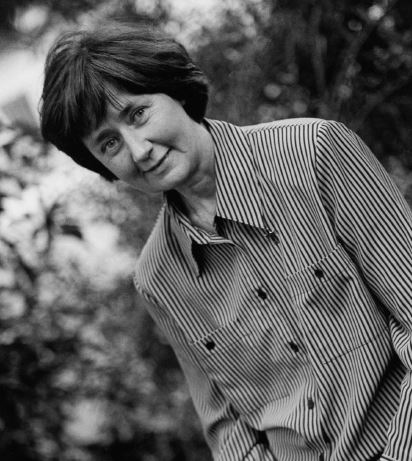
After being professed as a Sister in 1970, Adele qualified and worked as a school teacher, before undertaking theological studies. She then taught in the areas of Theology, Spirituality, Religious Education and Australian Studies at the Institute of Catholic Education (ICE), Mercy Campus Melbourne, (now Australian Catholic University).
“I think I was the first Sister of Mercy to study the new Bachelor of Theology in the 70’s, at the United Faculty of Theology, with students from the Anglican Church and the Uniting Church. My lecturers were fantastic, the best of the Anglican, Uniting, Lutheran and Catholic traditions, which included some wonderful Jesuit lecturers”.
Upon graduation, Adele was asked to teach at the ICE, and it was during this time that she also completed a Masters in Theology (1989). For her thesis, she chose the topic of ‘The Land As Sacred, A Theology of The Land from an Australian Christian Perspective’.
“As part of my research, I received a few months of leave and also a sponsorship from Mitsubishi of a vehicle to travel to remote areas of Australia. I traversed this vast landscape and visited a number of the Aboriginal communities where our Sisters were living and working at the time.
“It was there that I was able to listen and learn from people and was challenged to express anew my answers to the questions about what it means to be a Christian in Australia today, why our relationship with the Creator Spirit in this land is so important and how we can learn from Aboriginal People about their spiritual connection with the land”.
In writing and researching her thesis, Adele came to understand more deeply the significance of our relationship with Indigenous Australians and how we can learn from them about what it means to have a spiritual connection with the land and with the whole of creation.
“These insights nourished and deepened my own understanding of the revelation of our Creator God’s presence in this land over thousands of years.
“In looking back on my thesis, while the language in that time may have been slightly different, the focus on what we are called to respond to as people of Mercy today is the same – to the cry of Earth and the cry of the poor”.
Enabling Australia’s First People to have a Voice
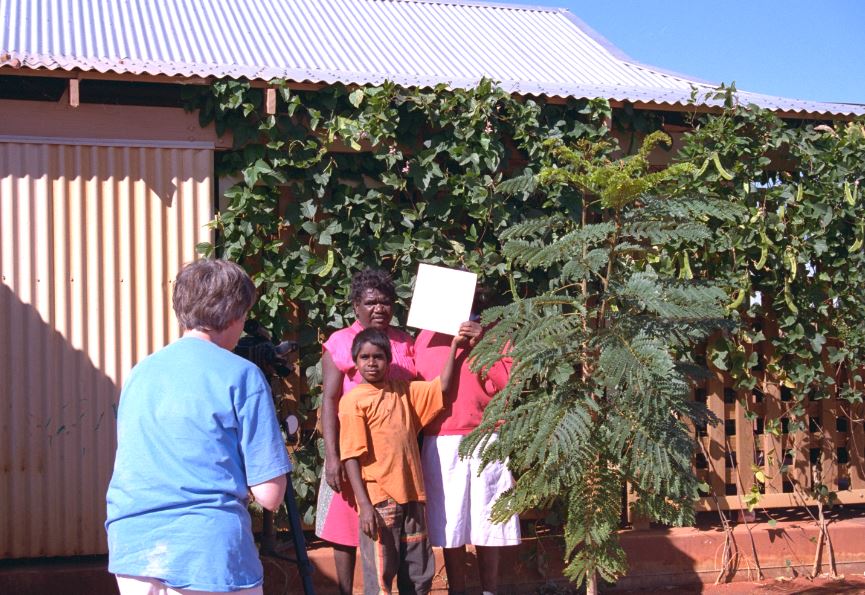
Storytelling in Australia’s Great Sandy Desert with local health workers and an ‘assistant’
Although not knowing it at the time, Adele’s thesis was merely the start of a long and rich journey of walking alongside Australia’s First People.
“When I was elected to the leadership team of the former Institute of Sisters of Mercy of Australia in 1988, one of my areas of responsibility was assisting our Sisters who were in schools and adult education centres in remote Aboriginal communities in the Great Sandy Desert”.
Adele said that it was through supporting our Sisters there, that she was invited by the local Aboriginal Communities and the Western Australian Health Department, to re-establish Community Health Services in the Kutjungka Region of Northern Western Australia. In the process of doing this, with the help of experienced Community Health Nurses, the reality of the impoverished conditions, profound disadvantage and vulnerability of the local communities became more evident.
“Appropriate funding for basic entitlements was not reaching these communities. They needed to have the means to tell their own stories directly into the comfortable living rooms of city people, and to those Australians who were completely unaware of the challenges of inequity faced by First Nations People in their own land.
“It is hard to remember, but back then there was no internet, not a lot of storytelling on video, not a lot of recognition of our need to stop, listen and learn directly from Aboriginal People.
“I knew that I needed to find a way to support their own voices and stories being heard directly”.
In furtherance of this aim, on completing her time in leadership, Adele enrolled and completed a Masters of Arts (Media Arts) at Deakin University to learn about using the new internet-based digital media platforms for communication, as well as professional courses in Documentary Video Production, Directing and Scriptwriting. As part of her MA, she completed a documentary ‘One Action Towards Reconciliation’.
A Woman of Mercy
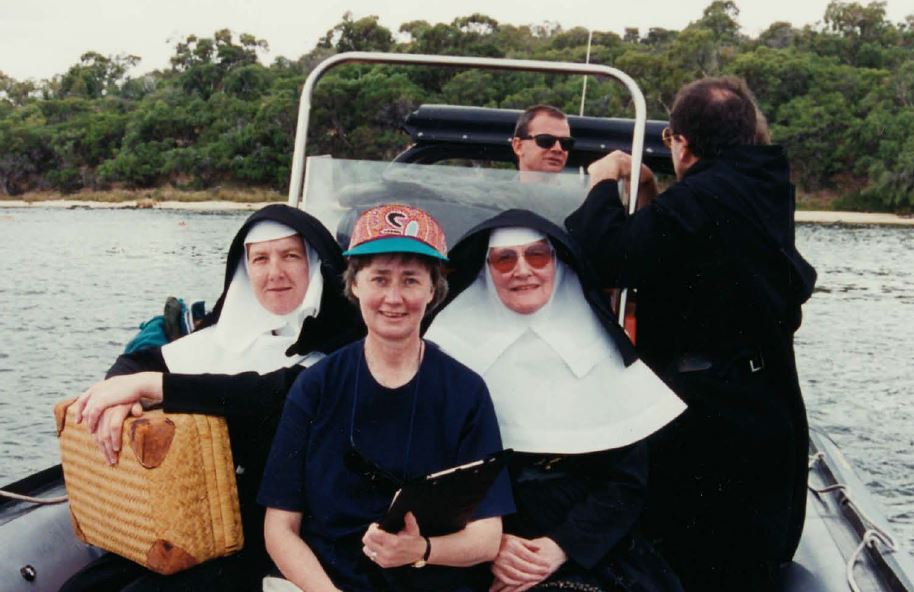
With two of the actors and crew filming the ‘Ursula Frayne – A Woman of Mercy’ documentary on the Swan River, Perth
While her initial desire was to give voice to Australia’s Indigenous community through video documentaries, it was the story of Ursula Frayne that became Adele’s first major video documentary project.
“In 1995, as I was finishing at Deakin, I was contacted by several of our Sisters and the Board of Mercy Education, saying they needed resources for the following year for their students and staff to celebrate the 150th Anniversary of the arrival of Ursula Frayne and the first Sisters of Mercy in Australia.
“In response, I developed the script with the help of Anne Walsh, who had been a teacher at the school founded by Ursula Frayne, ‘The Academy of Mary Immaculate’ in Fitzroy. Anne was also writing student and teacher texts for Collins Dove publishing. I invited her to assist me by writing a Story Book on Ursula Frayne, as well as student and teacher texts to accompany the documentary video.
“I then assembled a large cast in five filming locations around Australia from the ocean off the Fremantle coast, the Perth’s Swan River, the Warrnambool coast and Melbourne, particularly in Fitzroy.
“A professional camera, sound crew and editor worked with me and with a large production crew over six months. Together with many volunteers and other production professionals, musicians and audio technicians, we produced a 54-minute documentary ‘Ursula Frayne: A Woman of Mercy’“.
Following its well-received premiere at a private showing at Melbourne’s Rivoli Theatre in 1996, Adele registered the documentary with the name of the organisation who had produced it.
“In making the ISBN application and having the label printed, I had to give the newly formed Production group a name and my sister, Marcia, who wrote Ireland’s Daughter, the theme song we were able to use as the sound track of the documentary, said that as it was Ursula Frayne’s work going forward, it could be called ‘Fraynework Productions’. And so the label read, ‘Fraynework Productions is a video and multimedia production resource established by the Sisters of Mercy in Melbourne’.”
Fraynework
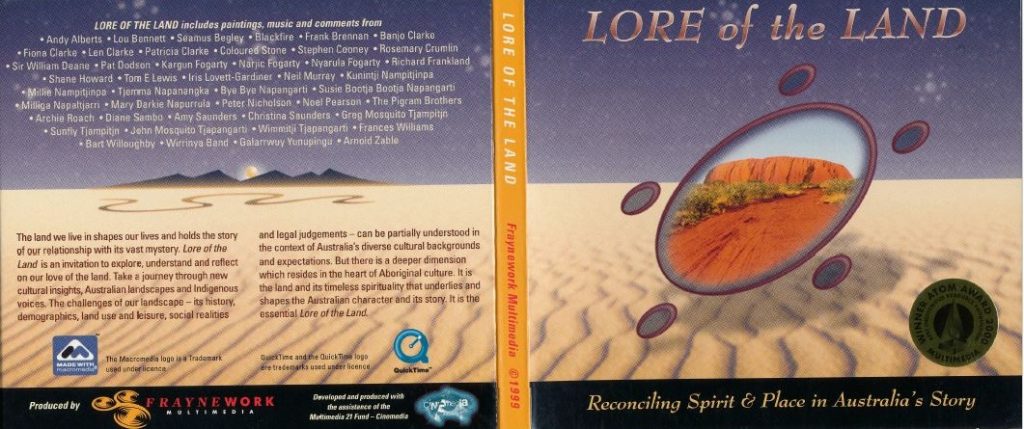
One of the many highlights from Adele’s time at what grew into Fraynework Multimedia, as it became known, was the production of an interactive CD-ROM documentary project, ‘Lore of the Land’.
“We submitted a tender and received funding from the Victorian Government and we raised money from elsewhere to enable it be produced.
“It won a series of national awards in the newly emerging multimedia genre. Interestingly a lot of people told me that they couldn’t believe that a Sister had produced it!
“We were lucky that we were able to produce work at the highest level with professional people, many of whom are still regarded as among the best in their field”.
At its peak of my time of development and leadership of Fraynework between 1996 and 2011, more than 100 people worked in the Fraynework team at different times, developing digital resources for interactive storytelling. The team included skilled designers, programmers and producers who were responsible for online productions, including educational and social justice resources for the broader community, drawing on the values of the Gospel.
“When I set out with the first documentary production I did not intended to start an organisation called Fraynework.
“It was just the work I was asked to do and then I needed help, so I gathered other people around me and then we got busier and more people gathered. The next thing I knew, we had great demands for our work and we needed to develop an organisational structure and strategy”.
It was at this time that Adele began to see a world of possibilities in the emergence of the internet and email.
“What I really wanted to do was to work with Aboriginal people and with our own Mercy Sisters. I wanted to use the new digital technologies as a platform to give voice and to develop better understanding between peoples.
“With Aboriginal people, I was keen to help them tell their own stories and for our Sisters I was keen to open up the world of this ‘new thing’ called the internet. My aim was to develop the platform and the capacity to teach our Sisters how to use the internet and email as new modes of personal and organisational communication and so enable everyone to have an equal voice – and that’s what we did!”.
In addition to running training at Fraynework for Mercy Sisters from across Australia and Sisters from around the world, Adele also set up an Indigital Centre with two young Aboriginal men, Casey and Gary, at the Fraynework premises in Carlton.
“We supported Casey and Gary through a Certificate IV in Multimedia at RMIT while they worked for Fraynework.
“We drew on a number of philanthropic trusts across Melbourne and I was able to raise $500,000 to set up a new music and skills training facility with computers, guitars and a sound recording studio. A number of talented musicians and mentors assisted Gary and Casey to run the programs of that Centre for young Aboriginal people.
“It meant that those attending the Indigital courses were often able to connect in new and life-giving ways, to learn from the team and each other and to exit the course with a sense of achievement, with a newly recorded CD of their own songs, with their life themes and struggles expressed in the lyrics and with often a new sense of personal satisfaction”.
Mercy International – Joining Energies Across Borders
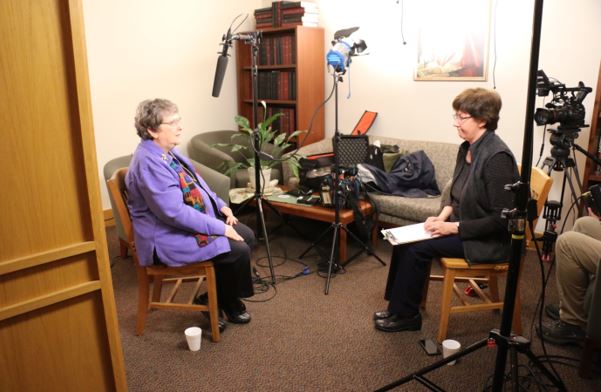
Adele interviewing Dr Elizabeth A Johnson CSJ at Fordham and other theologians in New York for ‘Voices’ in the Mercy International Reflection Process 2016
In 1998, building on her work in Australia, Adele was invited to Dublin by Sr Doris Gottemoeller and the Mercy Leaders from across the world to a Mercy International Association (MIA) meeting. She was asked to establish an online communications capability, policy and strategy for the relatively new association.
As part of the brief, the Fraynework team were asked to develop the first Mercyworld.org website. Since then, Adele has been involved with various Mercy international communications and programs. She has undertaken and been involved in numerous projects on the international stage both as the Director of Fraynework and as a consultant and independent documentary producer. In addition to Australia, Adele has met and filmed the stories of many Mercy sisters and Mercy workers throughout the world — from Peru to Kenya, South Africa, Pakistan, Cambodia and in the United Nations building, New York.
“I love the idea of joining energies, whether locally or internationally, as that’s when the ‘magic’ energy happens on screen. The ideas join together when expressed in inspiring ways, well edited and supported by the right soundtrack. The viewer is energised and realises what they hold in common as they cross bridges of new understanding.
“When the energies join, it is so much more powerful and effective then when one little voice is trying to beaver away. And that is what religious life is about – creating this goodness and knowing that we are all in this together!”.
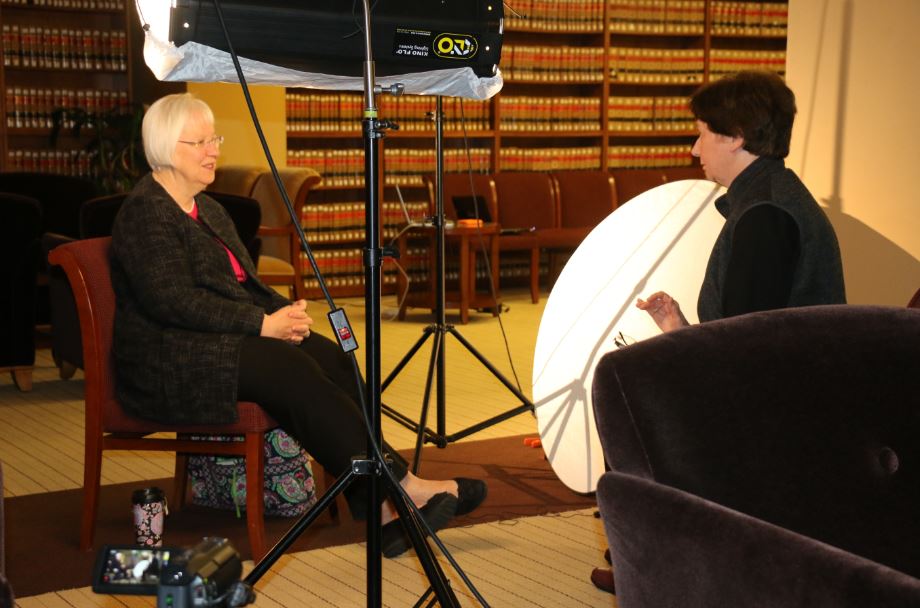
Adele interviewing Dr Julia Upton RSM and other theologians in New York for ‘Voices’ in the Mercy International Reflection Process 2016
Laudato Si
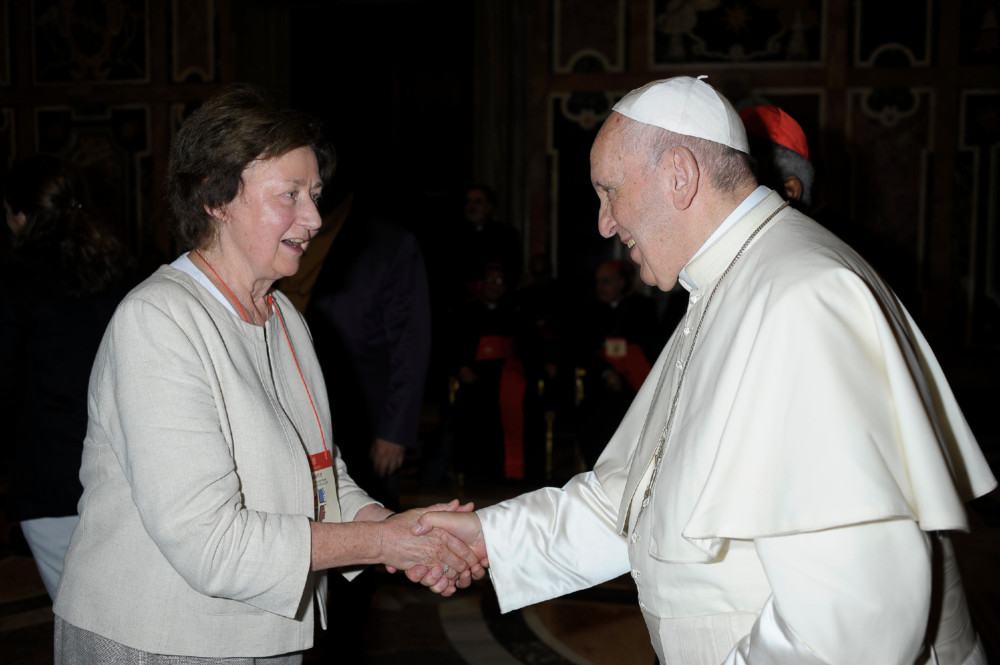
Meeting Pope Francis at the Laudato Si Conference at the Vatican in 2018
A strong area of focus for Adele in recent years and building on her long journey to understand ecological theology, is Pope Francis’ 2015 encyclical, Laudato Si’. In addition to presenting and unpacking the richness of this ground-breaking document through presentations locally and internationally, Adele is also member of the Vatican’s Religious Sector Working party for Religious Orders for the implementation of the Laudato Si’ Action Platform.
“Laudato Si’ is a document that continues to inspire me. Ecology and theology are two areas that have always been and will continue to be part of me as I search to express and act on the land as sacred.
“I am particularly inspired by the call for all of us to take the journey of the Laudato Si’ Action Platform over the next seven years by finding ways that the core messages of Laudato Si’ can be reflected in tangible action.
“In this regard, our Institute has been a leader in seeking to embrace the Integral Ecology of Laudato Si’ in all that we do”.
Life for me is Christ
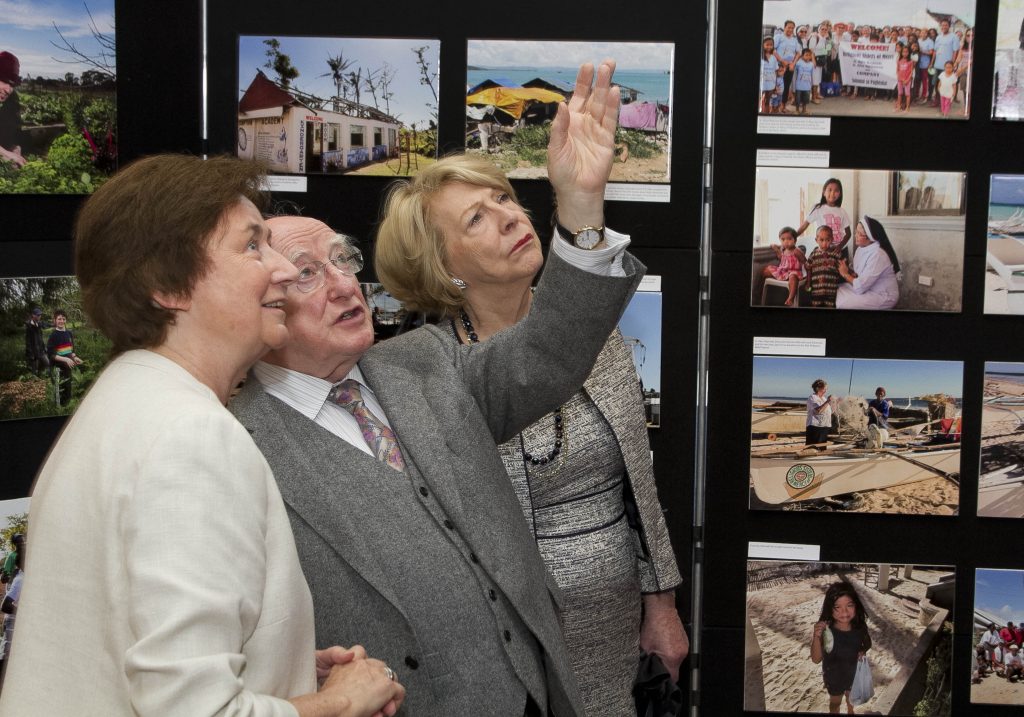
The President of Ireland, Michael D. Higgins and Sabina Higgins, opening The Face of Mercy photographic exhibition, curated by Adele, at Mercy International Centre, Dublin, on the 20th Anniversary of MIA in 2014. Picture Colm Mahady / Fennells – Copyright 2014 Fennell Photography.
With Adele’s work continuing on so many valuable paths, it is appropriate conclude with the words of the motto Adele chose when she was professed as a Sister of Mercy – ‘Life for me is Christ’.
Adele said that if you think about this motto, which is adapted from the words of St Paul to the Philippians, the reflective pathway of her life has been one of continuing to seek an answer to this question and what it means.
“If we really understand what the prologue of John’s Gospel is saying in ‘the Word became flesh and lived among us’, what we are really saying is that Jesus the Christ is present with us in the whole of creation.
“So, deep Incarnation is the mystery that I am challenged to keep unfolding in its fullness, in order to understand and to keep responding to the cry of Earth and the cry of the most vulnerable.
“These are the two dimensions of what it means to believe in the incarnate One, in Jesus as the risen Christ.
“Life for me is Christ and I am constantly engaged in responding to the quest of this mystery”.
Messages to: adele.howard@mercycommunications.org
